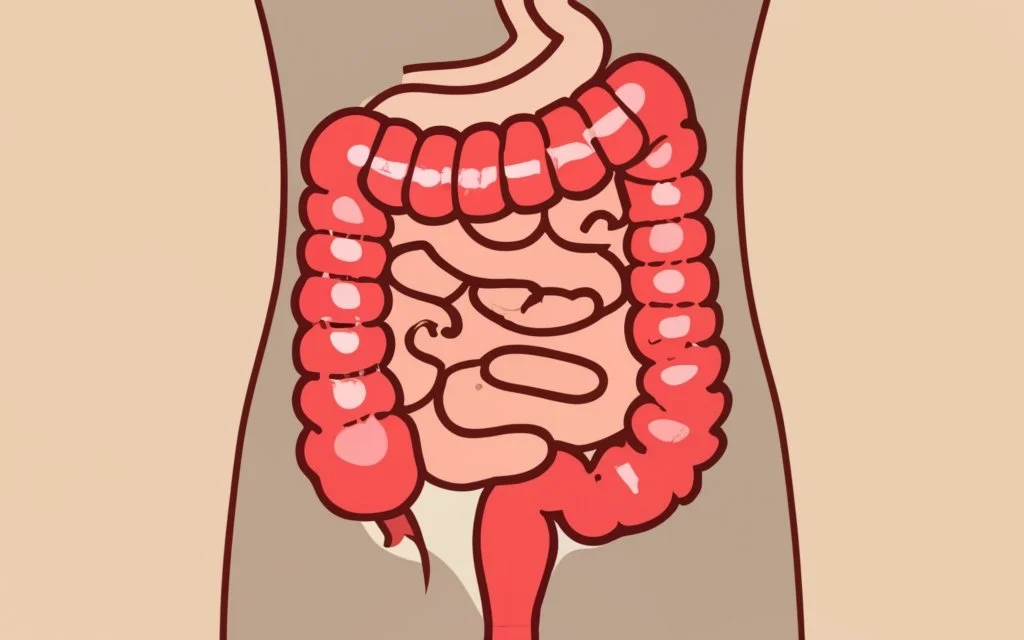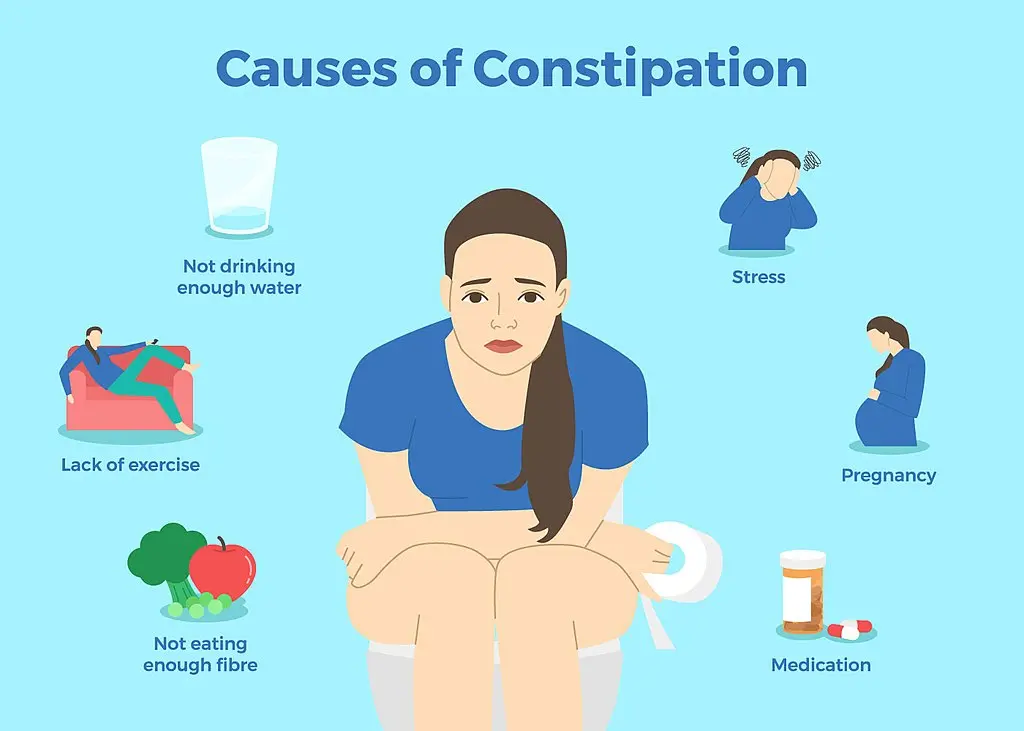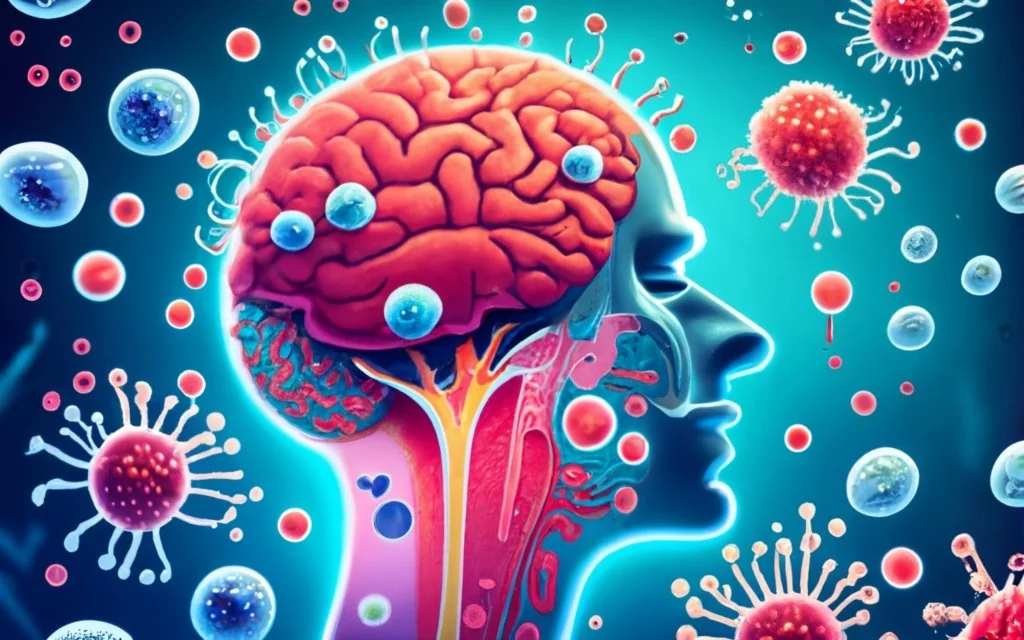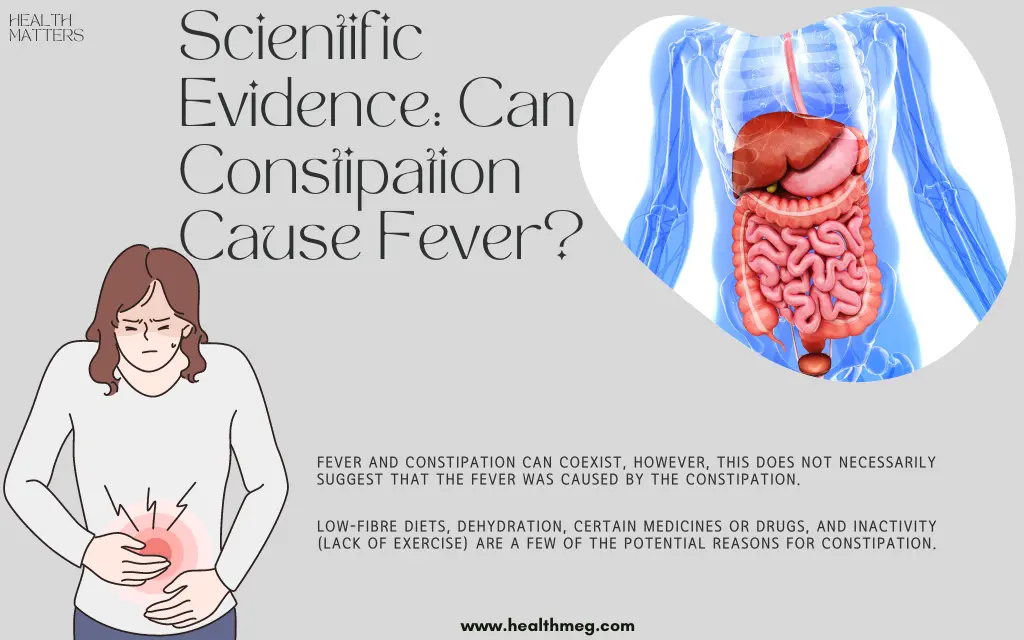“Can constipation cause fever?” – This is one of the puzzling questions that commonly pop up in this fascinating world that is filled with medical mysteries and the complex functioning of the human body. To start this adventure that is full of information, We must be familiar with the fundamental concepts of constipation and fever.
This article will explore what is constipation and fever, types, causes and symptoms, preventions, treatment, case studies related to constipation and Ayurvedic Treatment for Constipation or natural remedies for constipation. Is there a case, if constipation and fever can occur at the same time? If yes, then how? The intriguing link between constipation and fever will be our main focus as it has drawn interest from both the inquisitive and the medically minded.
Do Read the People Also Ask (FAQs) about this topic.
Introduction
Constipation and fever are two health issues that humans face from time to time. While each of those situations can be ugly, they can also be indicative of an underlying scientific trouble. In truth, a few humans agree that there may be a connection between constipation and fever, however, the question is, is this true?
To answer this question, it is vital to first recognize what constipation and fever are. Constipation is a circumstance wherein a person has a problem passing stool or has infrequent bowel movements. It can be a result of a variety of circumstances, consisting of a lack of fibre inside the food regimen, dehydration, or certain medicines. Fever, on the other hand, is a sign of an illness that triggers the temperature of the body to exceed above normal body temperature, i.e. the temperature of the body becomes greater than 98.6 F. It is commonly a signal that the human body is fighting contamination or infection.
While constipation and fever may occur together, it is crucial to point out that constipation can’t cause fever. Instead, the two conditions may be associated with an underlying scientific hassle. For instance, constipation may be a symptom of a contamination or infection that is causing the fever. Alternatively, the fever can be inflicting dehydration, which could result in constipation. Identifying the connection between such circumstances is critical for precise treatment and diagnosis.
Key Takeaways
- Constipation and fever are two distinct problems that may be linked to an existing health problem.
- Although constipation may not directly trigger fever, the two diseases may be linked by an underlying medical condition.
- Accurate diagnosis and treatment of constipation and fever are necessary for better wellness and health.
What is Constipation?
Constipation is a typical digestive issue that can affect anyone at any age. It is a medical disease where a person has irregular bowel movements or difficulties passing faeces. A low-fibre diet, dehydration, inactivity, some drugs, and medical illnesses like irritable bowel syndrome (IBS) and hypothyroidism are only a few causes of constipation.
Types of Constipation
The two basic types of constipation are as follows:-
- Primary Constipation
- Secondary Constipation
When there is no underlying medical illness contributing to the issue, the condition is referred to as primary constipation, also known as functional constipation. whereas, secondary constipation generally happens due to a medicine or underlying medical problem.
Types of Primary Constipation
There are mainly three types of primary constipation:-
- Slow transit constipation
- Pelvic floor dysfunction
- Outlet obstruction constipation
Detailed explanations for each type of primary constipation are as follows:-
- Slow transit constipation: Constipation with delayed transit takes place when the colon’s muscles fail to contract adequately, causing the stool to pass through the digestive system slowly. It affects more women than males and has several potential causes, including a low-fiber diet, inactivity, and some drugs.
- Pelvic floor dysfunction: When the muscles in the pelvic floor do not relax adequately during a bowel movement, it becomes challenging to pass faeces. It affects women more frequently than males and has several potential causes, including pregnancy, childbirth, and surgery.
- Outlet obstruction constipation: A blockage in the rectum or anus prevents stools from passing through due to which this kind of constipation occurs. Hemorrhoids, anal fissures, and rectal prolapse are a few of the causes that can make it more common in older persons.
Types of Secondary Constipation
Secondary constipation can occur from many different kinds of health issues and medicines (drugs). Some of them are as follows:-
- Medication
- Neurological disorders
- Endocrine problems
- Inflammatory bowel disease (IBD)
- Colorectal cancer
Detailed explanations for each type of secondary constipation are as follows:-
- Medication: Constipation is a side effect that can occur due to certain medications (drugs), including opioids, antacids, and antidepressants.
- Neurological disorders: Constipation can be a symptom of neurological illnesses, including Parkinson’s disease and multiple sclerosis, which impact the nervous system.
- Endocrine problems: Diabetes and hypothyroidism are two endocrine system disorders that can result in constipation.
- Inflammatory bowel disease (IBD): Constipation, diarrhoea, and abdominal pain are some of the symptoms of IBD, a chronic condition that causes inflammation in the digestive tract.
- Colorectal cancer: Constipation is frequently a sign of colorectal cancer. If you have chronic constipation or other symptoms like blood in the stool, abdominal pain, or unexplained weight loss, you should consult a doctor.
Understanding Constipation

Constipation is a major digestion issue that is experienced by billions of different people throughout the world. It is a medical problem that results in a lot of issues with every human being passing stools or infrequent bowel movements. Bowel movement rate varies from individual to individual, but less than three bowel movements per week are termed constipation.
Constipation signs include painful bowel movements, abnormal bowel motions, and the sensation of incomplete evacuation following a bowel movement. The pain could be strong or subtle, and it could be in the lower abdomen or the rectal area. Changes in bowel movements can result in firm, dry stools or loose, watery stools.
A low-fiber diet, dehydration, medication, hormonal changes, and certain medical disorders are all possible causes of constipation. Constipation can happen in some human beings as the outcome of a lack of regular physical exercise, stress, or a change in routine.
Constipation may trigger unease, gas and pain in the abdominal area. It is also capable of inflicting haemorrhoids and anal fissures, ensuing in tiny cracks in the layer of pores and skin around the location called the anus. Constipation can cause faecal impaction, a condition in which a firm stool becomes lodged in the rectum and cannot be passed.
Finally, constipation is a regular digestive disorder that can be caused by a variety of causes. It is distinguished by infrequent bowel movements, painful bowel movements, and the sensation of incomplete evacuation following a bowel movement. Constipation, if not properly treated, may result in distress, bloating(nausea or gas), and other issues.
The Digestive System and Constipation
The digestive system is responsible for digestion and nutrition consumption. The mouth, oesophagus, stomach, small and large intestines, rectum, and anus are all part of it. The large intestine, mainly the colon, serves as vital for eliminating waste from the human body.
Constipation is characterised by infrequent or difficult bowel movements. It is mainly caused by the sluggish transit of stool through the colon, which can result in waste material buildup. This problem can cause someone with stomach discomfort, bloating(gas or nausea), and pain.
Faecal impaction is a severe type of constipation in which faeces hardens and becomes lodged in the colon. This can additionally result in further diseases inclusive of vomiting, nausea, and fever in a person’s body.
Bowel movements are a key component of the food digestion mechanism. They contribute to the detoxification of contaminants from the circulatory system and assist in the avoidance of the accumulation of dangerous harmful substances. Constipation and other digestive problems can occur when bowel movements become infrequent or difficult.
In a nutshell, If I want to describe the digestive system, then it plays an integral part in the disposal of waste(toxic substances) from the body. Constipation occurs when bowel movements become infrequent or difficult to pass. Faecal impaction is an extreme case of constipation that may give rise to subsequent challenges as well. Bowel movements are important in sustaining an optimal digestive system and reducing the accumulation of dangerous substances.
Causes and Symptoms of Constipation

Causes
Constipation can be caused by a number of reasons, including:
- Diet
- Dehydration
- Lack of exercise
- Medication
- Medical problems
Explanations for each cause are as follows:-
- Diet: Constipation can be caused by a diet that is high in processed foods but poor in fibre. Fiber is crucial for preserving regularity in the bowels and fostering healthy digestion.
- Dehydration: Constipation may result from not drinking enough water. Water aids in the softening and facilitation of faeces.
- Lack of exercise: A lack of physical activity can impede the digestive process and result in constipation.
- Medication: Constipation is a side effect of some drugs, including painkillers and antidepressants.
- Medical problems: Irritable bowel syndrome (IBS), hypothyroidism, and diabetes are a few disorders that can lead to constipation.
Symptoms
Constipation symptoms might differ from person to person, but frequently include:
- Infrequent bowel movements: Bowel movements that occur less than three times a week are considered infrequent.
- Difficulty passing stools: Stools that are hard, dry, and difficult to pass are common symptom of constipation.
- Abdominal pain: Constipation can cause cramping and discomfort in the abdominal area.
- Bloating: Constipation can cause bloating and a feeling of fullness in the stomach.
- Nausea: In severe cases, constipation can cause nausea and vomiting.
It is significant to highlight that although constipation and fever might coexist, this is not a guarantee that constipation is the direct cause of the fever. An underlying illness or another medical problem could be the source of the fever. It is really important to consult a doctor if you are suffering from fever and constipation at the same time to find out the underlying cause and the best course of action.
Fever: An Overview
One of the common symptoms called fever is caused due to several disorders or illnesses, such as inflammation, bacterial infections, and other underlying diseases. The usual range for adults is between 97.7°F (36.5°C) and 99.5°F (37.5°C), and it can be described as a temporary rise in body temperature over that range in adults. Fever is frequently a symptom that the body is battling a disease or infection.
Causes
Viral and bacterial infections, inflammatory diseases, and certain drugs are only a few of the numerous potential causes of fever. The most frequent reason for fever is infection. Viruses, bacteria, fungi, and parasites are some of the possible causes of fever. Fever can also be a symptom of inflammatory diseases like lupus and rheumatoid arthritis as the immune system of the body is working to combat the inflammation. Taking certain drugs, such as antibiotics and antihistamines can cause side effects and develop fever in the human body.
Symptoms
Other symptoms like chills, sweating, headaches, aches in the muscles, and exhaustion are frequently present together with fever. Dehydration can occasionally result from fever, particularly if the patient isn’t getting enough fluids. If the fever is coupled with other symptoms like a strong headache, stiff neck, confusion, breathing difficulties, or chest pain, it’s crucial to visit a doctor.
Finally, it should be noted that fever is a typical symptom that can be brought on by several disorders, including infections, inflammation, and other underlying illnesses. If there are additional symptoms along with the fever or if it lasts longer than a few days, it is crucial to contact a doctor.
Fever: An Immune Response

A typical sign of diseases caused by bacteria or viruses is fever. Increasing the core body temperature over the normal range is the body’s natural defence mechanism against illnesses. It is very important to understand that the immune system is what triggers and controls the body’s fever response.
The immune system starts a chain of events that results in the generation of pyrogenic cytokines when it detects the presence of external invaders like bacteria or viruses. The set point is raised by these cytokines’ actions on the hypothalamic thermoregulatory centre, which controls how hot or cold the body is.
As soon as the set point is raised, the body reacts by producing heat using a variety of mechanisms, including shivering, vasoconstriction, and an accelerated metabolic rate. Invading pathogens cannot thrive in the warmer body temperature, which boosts the immune system and hinders the pathogen’s capacity to spread.
By stimulating distinct immune cells like T cells, B cells, and natural killer cells, fever additionally boosts the immune device. Invading pathogens can be efficiently detected and destroyed by these immune cells, hastening the healing process after infection.
In the final evaluation, fever plays a key immunological position that removes infections because of microorganisms or viruses from the human body. The immune system’s identification of foreign intruders sets it off, and the hypothalamus controls it. An unfavourable environment is created for the pathogens that are invading by the rise in body temperature, which also stimulates the immune system to effectively remove the invaders.
Bacterial Infections and Constipation

In some circumstances, bacterial infections might lead to constipation. Constipation is not a separate ailment under these circumstances; rather, it is a sign of the infection. For instance, a fever and constipation may both be brought on by a viral, bacterial, or parasite infection. In many situations, the infection rather than constipation itself is what causes the fever.
One sort of bacterial illness that can cause constipation is campylobacter infection. In a Mayo Clinic research, 38% of individuals who had IBS before the infection reported having more stomach pain frequently as a result of the campylobacter infection. According to Dr Jonathan B. Jassey, DO, patients with pre-existing IBS may transition from constipation to diarrhoea or mixed bowel patterns.
On the other hand, the gut microbiome is unrelated to chronic constipation. A study and update on gut microbiota and chronic constipation imply that pelvic floor dyssynergia, a decrease in intra-abdominal pressure, rectal sensory perception, and rectal contraction are the root causes of defecatory or rectal evacuation problems. Both non-transit and slow transit constipation are related to changes in the gut microbiota, which are characterized by a relative decline in obligate bacteria (such as Lactobacillus, Bifidobacterium, and Bacteroides spp.) and a parallel rise in potentially pathogenic microorganisms (such as Pseudomonas aeruginosa and Campylobacter jejuni).
As a result of bacterial infections, symptoms like fever and constipation can occur. Chronic constipation, however, has other causes and is unrelated to gut flora. To rule out any underlying disorders, it’s crucial to seek medical assistance if constipation is accompanied by abdominal pain and hard-to-pass faeces.
The Connection Between Constipation and Fever
Although constipation and fever can coexist, this does not necessarily entail (mean) that the former causes the latter i.e. constipation causes fever. Instead, an infection or inflammation could be responsible for the fever. Fever and constipation are not directly connected, but they may both be signs of the same underlying disease.
A fever can develop when the body is battling an illness or inflammation. The body’s natural reaction to a number of illnesses is a fever. An increase in body temperature is involved, which aids the body in battling the infection or inflammation. Constipation can sometimes be a sign of the illness which is responsible for the occurrence of fever.
Numerous illnesses can both induce fever and constipation. These are:-
- Inflammatory bowel disease (IBD)
- Diverticulitis
- Appendicitis
- Colitis
- Intestinal obstruction
Constipation sometimes results from a bad or unhealthy diet or is a side effect of a medication or drug. However, it’s crucial to get medical help if constipation and fever occur at the same time so that the underlying cause may be identified.
In conclusion, although a fever and constipation can coexist, a fever is not directly caused by constipation. Instead, they can be signs of a more serious problem that needs to be treated by a doctor. It’s crucial to consult a doctor if you’re suffering from fever and constipation at the same time so they can diagnose the underlying cause.
You can also find the connection between Low Testosterone Levels and Constipation. Discover How Low Testosterone Levels Can Lead to Constipation.
Scientific Evidence: Can Constipation Cause Fever?

Fever and constipation can coexist, however, this does not necessarily suggest that the fever was caused by the constipation. A study that was published in the Journal of Family Practice found that while fever is not a usual sign of constipation, it can happen if it is severe or persistent. A disease that contributes to both constipation and fever may be the root of the fever.
Low-fibre diets, dehydration, certain medicines or drugs, and inactivity (lack of exercise) are a few of the potential reasons for constipation. Constipation may result from a bad diet that is high in fats, deficient in fibre and nutritious drinks. Dehydration, on the other hand, might result in the faeces becoming dry, hard, and challenging to pass.
A study found that constipation might encourage the growth of dangerous bacteria in the stomach, which can result in inflammation and fever. This study was published by the World Journal of Gastroenterology. The release of cytokines as a result of the inflammation may also result in a fever.
Another study indicated that because of the retention of faecal matter in the colon, constipation can raise body temperature. This study was published in the Journal of Clinical Gastroenterology. Pressure and inflammation brought on by the trapped faeces may result in a fever.
Finally, while constipation is not typically a cause of fever, in some circumstances, it might help the fever develop. It is important to identify and treat the underlying causes of both constipation and fever. Constipation can be avoided and the risk of problems can be decreased with a good diet, consistent exercise, and proper hydration.
Potential Mechanisms of Fever in Constipation
Even though constipation and fever both happen at the same time, constipation does not directly induce fever. Instead, a problem that is causing both constipation and fever may be underlying, with fever acting as a symptom. Following are some possible pathways that could result in fever and constipation:
- Infection
- Dehydration
- Medications
- Inflammatory Bowel Disease
- Cancer
1. Infection
An infection is one of the most typical causes of fever in constipation. Fecal debris can build up in the colon as a result of constipation, which can foster the growth of dangerous germs. This may result in infections like diverticulitis, which can bring on symptoms including fever, cramping, and constipation. Urinary tract infections are another possibility, and they can result in fever and constipation.
2. Dehydration
Constipation and fever are two symptoms of dehydration. A fever might develop when the body is dehydrated because it may be unable to control its temperature. Electrolyte abnormalities brought on by dehydration might also result in constipation.
3. Medications
Fever and constipation are both side effects of several drugs. For instance, opioids are known to produce constipation and, in some people, a fever. Fever and constipation can also be side effects of other drugs, including antipsychotics and antidepressants.
4. Inflammatory Bowel Disease
Constipation and fever are both symptoms of inflammatory bowel disease (IBD), which includes Crohn’s disease and ulcerative colitis. Chronic IBD produces inflammation in the gastrointestinal tract, which can result in constipation, stomach pain, and fever.
5. Cancer
Fever and constipation are occasionally signs of malignancy. For instance, colon cancer can obstruct the colon, which might result in fever and constipation. Constipation and fever can also be caused by other cancers, such as ovarian cancer.
The bottom line is that while constipation is not a direct cause of fever, it might be a symptom of an underlying disease due to that is causing both constipation and fever. Possible reasons that could result in fever in constipation include infections, dehydration, medicines, IBD, and malignancy. To identify the underlying cause and receive the best therapy, it’s really important to have a visit to a medical professional if you are suffering from both fever and constipation.
Case Studies of Constipation
Numerous case studies have been done to better understand the correlation between constipation and fever. Here are a few illustrations:
Case Study 1
An abdominal ache and 101°F fever were present in a 35-year-old female patient. She described feeling constipated and having not had a bowel movement in three days. She was suffering from a colon infection, which was most probably caused by constipation, based on the results of a medical examination. She recovered completely after receiving antibiotic and laxative treatment.
Case Study 2
A 57-year-old guy with a 102°F fever and severe constipation was taken to the hospital. He was in pain and bloated, and he hadn’t had a bowel movement in over a week. He had a blockage in his colon, which was the root of his constipation and fever, according to several rounds of testing. He had surgery to remove the obstruction, and medicines were given to him to treat the infection. He recovered entirely.
Case Study 3
A 10-year-old kid was brought to the ER complaining of stomach ache and having a fever of 103°F. He was extremely constipated and hadn’t had a bowel movement in four days. He was found to have an infection in his intestines, which was most probably caused by the constipation, following a physical examination and blood testing. He recovered fully after receiving antibiotic and laxative treatment.
Since constipation can result in infections and blockages in the colon and intestines, these case studies show that it is possible that constipation can cause fever. If you feel both constipation and fever, you should contact a doctor right away because this could indicate a more serious underlying issue.
Prevention and Treatment of Constipation-Induced Fever
Fever can be caused by a variety of factors, however, constipation is not the main reason for it. People can take the following actions to stop constipation from developing fever:
Prevention

- Drink a lot of water: dehydration frequently leads to constipation. This will keep the faeces soft and easy to pass.
- Consume foods high in fibre: Having foods that are high in fibre increases stool volume and eases passing. Excellent sources of fibre include whole grains, legumes, fruits, and vegetables.
- Exercise on a regular basis: Exercise stimulates the bowels and helps regular bowel motions.
- Pay attention to your urges for bathroom breaks (to go for pee): Ignoring urges to pass stool or to go for a pee can result in constipation. It is important for people to act on their urges as soon as they can.
Treatment

If a fever caused by constipation has already occurred, the following therapies (treatments) may be helpful:
- Take laxatives: Utilize laxatives to help with stool softening and to encourage bowel motions. They must be utilized carefully and only when directed by a doctor.
- Use enemas: By flushing out the faeces, enemas can assist in treating constipation. They must, however, only be utilized in extreme cases and with medical guidance.
- Consume a diet low in fibre: A low-fibre diet can aid in relieving constipation. It must be used carefully and only when directed by a physician.
People should seek medical assistance if they are experiencing severe constipation. To identify and treat the underlying issue, medical professionals may advise treatments like endoscopy.
Medical Interventions for Constipation

Several medical methods are available to deal with constipation and assist in reducing signs. The underlying reason for the constipation, the intensity of the symptoms, and the patient’s general health all influence the therapy option.
- Stool Softeners
- Other Medications
- Laxatives
- Prokinetics
- Enemas
1. Stool Softeners
Emollient laxatives sometimes referred to as stool softeners, function by pulling water into the stool to make it softer and simpler to pass. They are frequently advocated for those who have trouble passing dry, firm stools.
Docusate sodium, which is offered both over-the-counter and by prescription, is one frequently used stool softener. It is typically regarded as secure and efficient for brief use. However, extended usage of stool softeners might result in electrolyte imbalances and other issues, so it’s critical to strictly adhere to the dosage recommendations.
2. Other Medications
Numerous different medicines can be used to treat constipation in addition to stool softeners. These consist of:
- Laxatives: These aid in bowel movement by activating them. Laxatives come in a variety of forms, such as bulk-forming, osmotic, stimulant, and lubricant laxatives.
- Prokinetics: These drugs assist the food move more easily through the digestive tract, which can ease constipation.
- Enemas: This aids in softening and releasing the stool by flushing water or other fluids into the rectum.
Ayurvedic Treatment for Constipation (Natural Remedies for Constipation)

The ancient Indian medical system known as Ayurveda sets an enormous value on using herbal treatments (natural remedies) to improve health and fitness and fight off illness.
Ayurvedic constipation remedies include enhancing digestion and encouraging regular bowel movements.
Here are some Ayurvedic treatments (Natural Remedies) for constipation relief:
- Triphala
- Psyllium Husk
- Castor Oil
- Ghee
- Hot Water
- Ayurvedic Herbs (Natural Remedies)
Briefly Explanation for each Ayurvedic treatment (Natural Remedies) for constipation relief are as follows:-
- Triphala: Triphala, a combination of the three fruits Amalaki, Bibhitaki, and Haritaki, is frequently prescribed as a treatment for constipation in Ayurvedic medicine. By encouraging the passage of faeces through the intestines, it acts as a natural laxative. Triphala comes in pill, capsule, and powder form.
- Psyllium Husk: A naturally occurring source of soluble fibre that absorbs water and congeals in the intestines (forms a gel-like substance) is psyllium husk. This facilitates bowel movements by softening the faeces. Psyllium husk is available as a powder and a capsule.
- Castor Oil: Natural laxative castor oil stimulates the bowels and encourages bowel motions. Usually, it is consumed orally in tiny dosages. As it can cause cramps and diarrhoea, castor oil should be used with caution.
- Ghee: Clarified butter, often known as ghee, is frequently used in Ayurvedic treatment. The digestive tract is said to be lubricated, and it is thought to encourage regular bowel motions. Ghee can be consumed orally in modest doses or added to food.
- Hot Water: Warm water consumption might encourage bowel motions and relieve constipation. On an empty stomach, you should have a glass of warm water first thing in the morning.
- Ayurvedic Herbs (Natural Remedies): Ginger, cumin, and fennel are examples of Ayurvedic herbs that can help with digestion and encourage regular bowel motions. These herbs can be consumed as a supplement or in meal form.
Before starting any new constipation remedy, it is crucial to speak with a licensed Ayurvedic practitioner. In addition to these treatments, maintaining a healthy diet and way of life can also aid with constipation relief.
Medical Conditions
Constipation can occasionally be a sign of a serious medical problem. The best technique to relieve constipation in these situations is frequently by treating the underlying issue.
Constipation may result from several medical disorders, including:
- IBS, or irritable bowel syndrome
- IBD, or inflammatory bowel disease
- Hypothyroidism
- Diabetes
- Parkinson’s condition
- a number of sclerosis
To identify the underlying cause and create a suitable treatment plan, it is crucial to consult a healthcare professional if constipation is a recurring issue.
Conclusion
In last, there is a possibility that constipation and fever might coexist, this does not necessarily imply that constipation is the direct cause of a fever. An infection or another underlying medical issue could be responsible for the fever.
Constipation is a typical digestive issue that can be caused by a variety of issues, including a low-fiber diet, dehydration, and inactivity. Constipation can result from stools that are firm and challenging to pass when the colon is working slowly.
Maintaining a nutritious diet full of fibre and fluids, engaging in regular exercise, and avoiding medicines or drugs that have the potential to produce constipation as a side effect are all key ways to prevent constipation. Depending on the severity of the disease, treatment for constipation may involve dietary adjustments, over-the-counter laxatives, or prescription drugs.
To rule out any underlying medical issues, it’s critical to seek medical assistance if fever and constipation coexist. Fever may sometimes be a symptom of a more severe illness, such as an infection or inflammatory bowel disease.
Overall, it is really important to keep in mind that while constipation and fever can happen at the same time, constipation does not cause fever directly. People can effectively avoid and treat constipation and other digestive issues by leading a healthy lifestyle and obtaining medical care as needed.
People Also Ask (FAQs)
Q: Can constipation cause fever symptoms?
A: Constipation itself does not cause fever symptoms. Fever may be caused by an underlying infection or inflammation in the body.
Q: What symptoms can constipation cause?
A: Constipation can cause symptoms such as infrequent bowel movements, hard or lumpy stools, abdominal pain, bloating, and discomfort during bowel movements.
Q: Can you get an infection from constipation?
A: Constipation can lead to infections such as diverticulitis or faecal impaction if stool builds up in the colon. To prevent these complications, It is really important to maintain regular bowel movements.
Q: What are the 4 types of constipation?
A: The four types of constipation are normal transit constipation, slow transit constipation, pelvic floor dysfunction, and secondary constipation. There are different causes and treatment options for each constipation type.
Q: How can I quickly treat constipation?
A: Constipation can be treated with over-the-counter medications or prescription drugs, as well as lifestyle changes such as increasing fibre consumption and physical activity (Exercise) play an important role. A doctor might advise procedures like a colonoscopy or surgery in extreme circumstances.
Q: What should I eat if I have a fever and constipation?
A: Maintaining a sufficient water intake in your body and eating a balanced diet that incorporates fibre-rich foods like fruits, vegetables, and whole grains is crucial if you have a fever and constipation at the same time.
Q: Is milk good for constipation?
A: Some people’s constipation may get worse if they drink milk, especially if they have a lactose intolerance. You must pay attention to your body’s signals and stay away from such meals that make your symptoms worse.
Q: Which Ayurvedic medicine is best for constipation?
A: Triphala, psyllium husk, and castor oil are a few of the various natural remedies for constipation that are available in Ayurvedic medicine. Before utilizing any herbal medicines, it is crucial to seek medical advice.
Q: Which Indian food is good for constipation?
A: Lentils, beans, and vegetables are just a few of the fibre-rich items found in Indian cooking that might ease constipation. To avoid constipation, it is really important to have a balanced diet and drink plenty of water.
Q: Can fever and headache be caused by constipation?
A: A fever or headache is not directly brought on by constipation. Constipation may be a signal of an underlying infection or sickness that can produce fever and headache, but, it is also accompanied by other symptoms like stomach discomfort, nausea, and vomiting.
Q: Can sweating and chills be caused by constipation?
A: Sweating and chills are not caused by constipation alone. However, constipation may be an indication of an underlying infection or illness that can produce chills and sweats if it is also accompanied by other symptoms like fever, stomach discomfort, and nausea.
Q: Can hot and cool flashes be caused by constipation?
A: Hot and cool flashes are not only brought on by constipation. However, constipation may be an indication of an underlying infection or sickness that can induce hot and cold flashes if it is accompanied by other symptoms like fever, stomach discomfort, and nausea.
Q: Can fever and constipation coexist?
A: If an underlying infection or sickness is producing both symptoms, fever and constipation may coexist. The presence of a temperature, however, is not a direct result of constipation.
Q: Can constipation be a sign of a medical condition?
A: Constipation can be a sign of several conditions, including colorectal cancer, irritable bowel syndrome, and inflammatory bowel disease. To rule out any underlying medical concerns, it is crucial to seek medical assistance if constipation is persistent or accompanied by other symptoms.
Q: Is Constipation caused by a viral infection?
A: Yes, constipation can result from a viral infection. Constipation can result from viral illnesses that interfere with the digestive system’s regular operation, like the stomach flu. However, because it can also be brought on by other things like food and medication, constipation may not always be a trustworthy sign of a viral illness.
References
- PubMed (https://pubmed.ncbi.nlm.nih.gov/): A reliable source for scientific articles and research papers related to constipation, fever, and their potential connections.
- Mayo Clinic (https://www.mayoclinic.org/): A reputable medical website that provides detailed information on various health topics, including constipation and fever.
- Centres for Disease Control and Prevention (CDC) (https://www.cdc.gov/): The official website of the CDC provides valuable insights into various health conditions and can be a reliable reference for fever-related information.
- National Institutes of Health (NIH) (https://www.nih.gov/): As a leading research institution, the NIH’s website offers authoritative information on health and medical topics.
- World Health Organization (WHO) (https://www.who.int/): The WHO website can provide global perspectives on health issues, including fever and related conditions.
- American Gastroenterological Association (AGA) (https://gastro.org/): The AGA’s website may offer insights into gastrointestinal health and constipation.
- Medical textbooks and publications: Consider referencing respected medical textbooks or peer-reviewed articles from reputable journals.
These are some of the important reference links related to fever and constipation.












